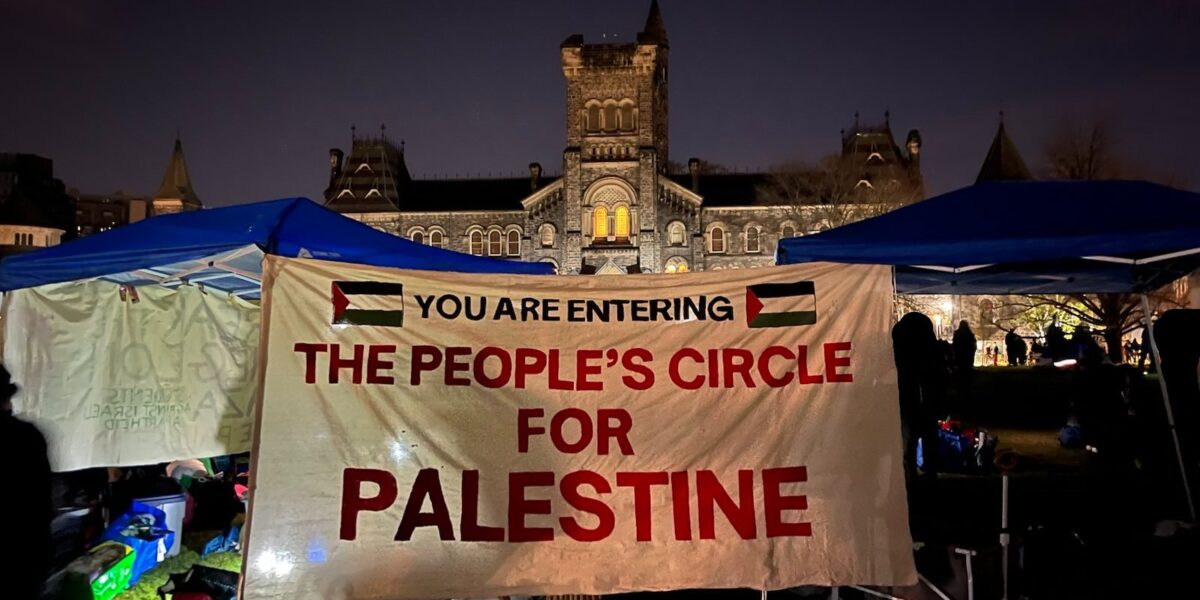One month ago, a pro-Palestine protest encampment formed at Columbia University on April 17.
Within the last two months, on-campus encampments have spread throughout universities across North America, the UK, Canada, Australia and elsewhere.
OccupyUofT and other protest encampments formed in response to Israel’s attacks on the civilian Palestinian population since October 7, though a push for divestment has existed at the University of Toronto (UofT) since 2006.
OccupyUofT’s media spokesperson, Mohammed Yassin, shared that “It’s been many years now where the university is turning a blind eye to this. And now is a critical moment where we have the world finally looking at Palestine.”
Students at UofT have been trying to rally to push for divestment from Israel for around seven months now, and have had all sorts of campaigns.
“We’ve had vigils, we’ve had die-ins, we’ve had rallies,” shared Yassin.
The series of campaigns, alongside a lack of response from the university, eventually resulted in the occupation of university president Meric Gertler’s office in April [find date].
“They ignored all our emails. So we didn’t have a single meeting until we took his office for 30 hours. And then suddenly they wanted to talk to us,” said Yassin.
The occupation of President Gertler’s office was done with the demand that UofT divest from military companies only. This was followed by a meeting with Gertler, which Yassin describes as having no significant outcome.
“He rejected all of our demands. So this encampment is simply just an escalation,” he said.
OccupyUoft has three demands, the first is to divest from all Israeli companies, the second is to disclose the details of their investments, and the third is to cut ties with all Israeli academic institutions.
Yassin explained: “they [UofT] have hidden all their investments for years now. But we have it on good authority, both from president Gertler’s mouth himself when he confirmed that they invested in military companies, and also through previous documents that previous movements before ours had obtained, that UofT does invest in military companies and Israeli companies that do promote and sustain the occupation of Palestine. We just don’t know exactly how much, and where.”
Yassin shared that since the encampment began, UofT has “explicitly refused to talk about a single demand. They haven’t even mentioned the words Palestine or Gaza”
He shares that the university releases public statements every day, which address trivial matters such as safety concerns as opposed to their demands.
“They’re saying the encampment is a fire hazard,” said Yassin. “We’ve made sure there are no flames at all, and in the camp we make sure that everything is spaced out. We have fire exits, we have all this stuff yet they constantly try to push to have fire marshalls come in to deem it a health and safety hazard so that the Toronto Police Service (TPS) can come in and violently clear us.”
Yassin adds that, “the university is trying to wash their hands of involvement with the TPS, although they are working hand in hand. They are inciting the police against us through false accusations of safety concerns.”
He highlights that this is a grassroots movement led predominantly by students at UofT, despite accusations of outside agitators.
“We’re not here to talk about fire hazards. We’re here to talk about how the university is currently complicit in an ongoing genocide,” he said.
The University of British Columbia Okanagan (UBCO) campus similarly set up an encampment on May 13, following the lead of the University of British Columbia who had set up theirs on April 29.
An student from UBCO encampment collective who spoke to rabble on condition of anonymity shared that, “UBC student activists have been fighting for years to push the UBC Board of Governors to divest the UBC endowment fund from Israeli apartheid and genocide in Palestine.”
The same student shared that, “thousands of emails and hundreds of letters were sent from students on both campuses to Bacon, Cormack, and the BOG calling for them to condemn Israel’s genocide, divest the endowment, and simply start using the word “Palestine” rather than vague and harmful discourse of “Israel-Hamas war,” “conflict in the Middle East,” etc. To our knowledge, not a single student received a reply.”
They stated that the UBC encampment aims for divestment from, “all companies complicit in the Israeli apartheid regime and in the oppression and genocide of Palestinians,” to “stop, and offer reparations for, all archaeological excavations on Palestinian land,” and to “cut all ties with these three Israeli universities that are complicit in the ethnic cleansing of
Palestinians: Tel Aviv University, Technion-Israel-Institute of Technology, and Hebrew University of Jerusalem.”
They also aim for a public condemnation from the university and a “demand an end to the genocide in Gaza, and condemn the scholasticide in Gaza,” and for the university to ensure the safety of students on campus through keeping “cops off our campuses.
The student shared that “the RCMP engages in suppression and violence against BIPOC, Land Defenders and other marginalised communities.”
Both the spokesperson of OccupyUofT and the student from UBCO shared that they have noticed an increase in the Pro-Palestine movement within the last seven months, with professors, alumni, students, and unions joining the movement on campus.



